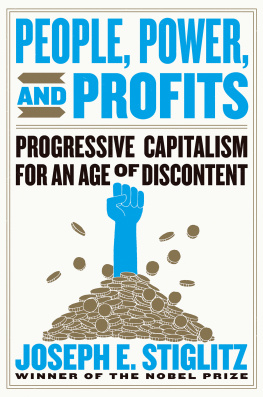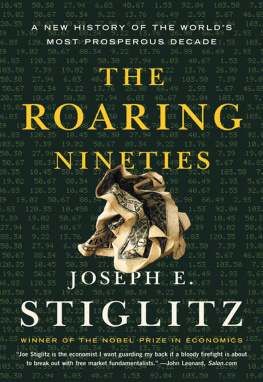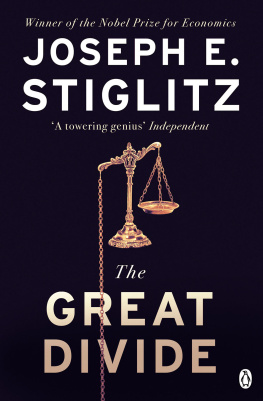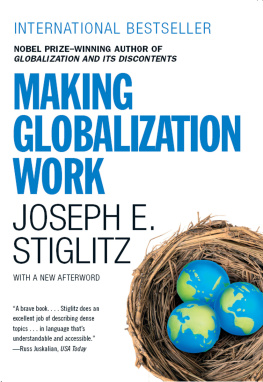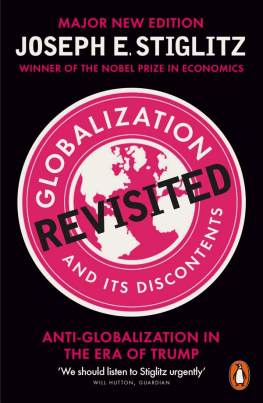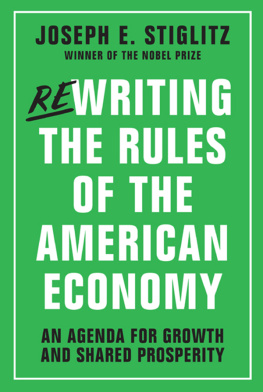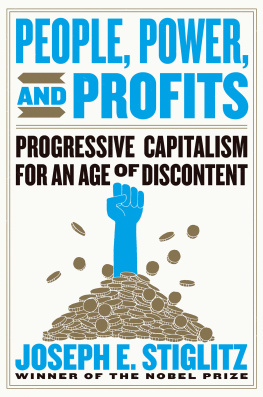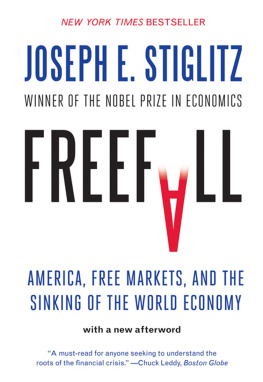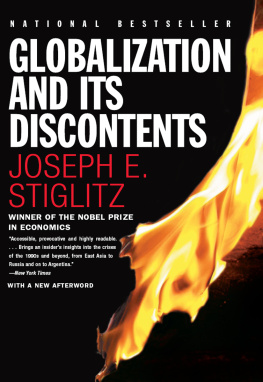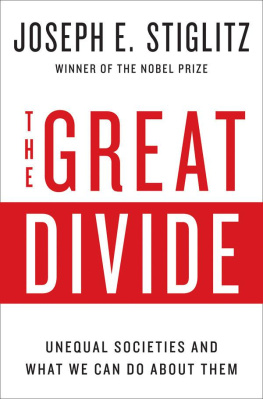Contents
Guide

ALSO BY JOSEPH E. STIGLITZ
The Euro: How a Common Currency Threatens the Future of Europe
Rewriting the Rules of the American Economy: An Agenda for Growth and Shared Prosperity
The Great Divide: Unequal Societies and What We Can Do about Them
Creating a Learning Society: A New Approach to Growth, Development, and Social Progress
(with Bruce C. Greenwald)
The Price of Inequality: How Todays Divided Society Endangers Our Future
Freefall: America, Free Markets, and the Sinking of the World Economy
The Three Trillion Dollar War: The True Cost of the Iraq Conflict
(with Linda J. Bilmes)
Making Globalization Work
Fair Trade for All: How Trade Can Promote Development
(with Andrew Charlton)
The Roaring Nineties: A New History of the Worlds Most Prosperous Decade
Globalization and Its Discontents
JOSEPH E. STIGLITZ

PEOPLE, POWER, AND PROFITS

PROGRESSIVE CAPITALISM FOR AN AGE OF DISCONTENT

Copyright 2019 by Joseph E. Stiglitz
All rights reserved
First Edition
For information about permission to reproduce selections from this book, write to Permissions, W. W. Norton & Company, Inc., 500 Fifth Avenue, New York, NY 10110
For information about special discounts for bulk purchases, please contact W. W. Norton Special Sales at specialsales@wwnorton.com or 800-233-4830
Book design by Chris Welch
Production manager: Lauren Abbate
ISBN: 978-1-324-00421-9
W. W. Norton & Company, Inc., 500 Fifth Avenue, New York, N.Y. 10110
www.wwnorton.com
W. W. Norton & Company Ltd., 15 Carlisle Street, London W1D 3BS
1 2 3 4 5 6 7 8 9 0
To my grandchildren.
And to my dear friends Tony Atkinson
and Jim Mirrlees, who left this world all too soon.
CONTENTS
PART I
LOSING THE WAY
PART II
RECONSTRUCTING AMERICAN POLITICS AND ECONOMICS: THE WAY FORWARD
I grew up in the golden age of capitalism, in Gary, Indiana, on the southern shore of Lake Michigan. It was only afterward that I found out that was the golden age. At the time, it didnt seem so goldenI saw massive racial discrimination and segregation, great inequality, labor strife, and episodic recessions. One couldnt help but see the effects, both on my schoolmates and on the faade of the city.
The city traced the history of industrialization and deindustrialization in America, having been founded in 1906 as the site of the largest integrated steel mill in the world, and named after the founding chairman of US Steel, Elbert H. Gary. It was a company town through and through. When I went back for my fifty-fifth high school reunion in 2015, before Trump had become the fixture in the landscape that he is today, the tensions were palpable, and for good reason. The city had followed the countrys trajectory toward deindustrialization. The population was only half of what it was when I was growing up. The city was burned out. It had become a filming location for Hollywood movies set in war zones, or after the apocalypse. Some of my classmates became teachers, a few, doctors and lawyers, and many, secretaries. But the most poignant stories at the reunion were from classmates who described how, when they graduated, they had hoped to get a job in the mills but the country was in another episodic downturn and instead they went into the military, setting their life trajectory into a career in policing. Reading the roster of those of my classmates who had passed away, and seeing the physical condition of many of those who remained, was a reminder of the inequalities in life expectancy and health in the country. An argument broke out between two classmates, a former policeman virulently criticizing the government, and a former schoolteacher pointing out that the Social Security and disability payments the former policeman depended on came from that same government.
When I left Gary in 1960 to study at Amherst College in Massachusetts, who could have predicted the course history would take and what it would do to my city and my classmates? The city had shaped me: the gnawing memories of inequality and suffering induced me to switch from my passion for theoretical physics to economics. I wanted to understand why our economic system failed for so many, and what could be done about it. But even as I studied the subjectcoming to better understand why markets often dont work wellthe problems were growing worse. Inequality was increasing, beyond anything that had been imaginable in my youth. Years later, in 1993, as I entered the administration of President Bill Clinton at first as a member, and then chair, of the Council of Economic Advisers (CEA), these issues were just beginning to come into focus; sometime in the mid-1970s or early 1980, inequality took a nasty turn upward, so that by 1993, it was far greater than it had been any time in my life.
My study of economics had taught me that the ideology of many conservatives was wrong; their almost religious belief in the power of marketsso great that we could largely simply rely on unfettered markets for running the economyhad no basis in theory or evidence. The challenge was not just to persuade others of this, but to devise programs and policies that would reverse the dangerous increases in inequality and the potential for instability from the financial liberalization begun under Ronald Reagan in the 1980s. Troublingly, faith in the power of markets had spread by the 1990s to the point where financial liberalization was being pushed by some of my own colleagues in the administration, and eventually by Clinton himself.
My concern with increasing inequality grew while I served on Clintons CEA, but since 2000 the problem has reached ever more alarming heights as inequality grew, and grew, and grew. Not since before the Great Depression have the countrys richest citizens captured such a large proportion of the nations income.
Twenty-five years after entering the Clinton administration I find myself reflecting: How did we get here, where are we going, and what can we do to change course? I approach these questions as an economist, and not surprisingly, I see at least part of the answer lying in our economic failuresthe failure to handle well the transition from a manufacturing economy to a service-sector economy, to tame the financial sector, to properly manage globalization and its consequences, and most importantly, to respond to the growing inequality, as we seemed to be evolving into an economy and democracy of the 1 percent, for the 1 percent and by the 1 percent. Both experience and studies have made it clear to me that economics and politics cannot be separated, and especially not in Americas money-driven politics. So while most of this book focuses on the economics of our current situation, I would be remiss if I did not say something about our politics.
Many elements of this diagnosis are by now familiar, including excessive financialization, mismanaged globalization, and increasing market power. I show how they are interrelated, how, together, they explain both why growth has been so anemic and why the fruits of what little growth weve had have been so unequally shared.

